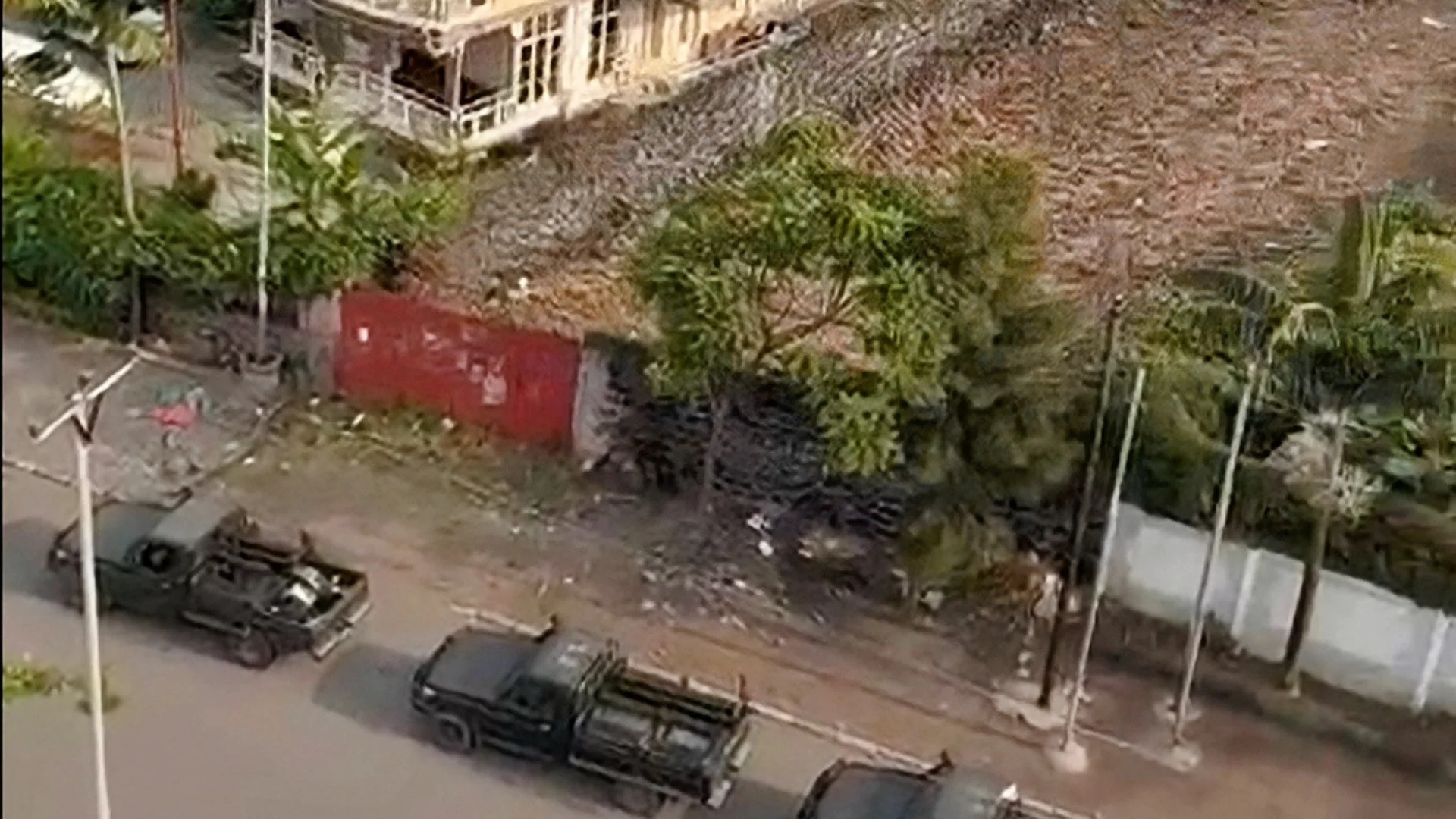Fresh News from the Worldwide Network of the Xaverian Missionaries – 2.2.2025
Goma Under Siege. Rwanda Takes the City, Looting and Fear Among the Population

GOMA, North Kivu, DRC – January 27, 2024 – “It was a disaster.” This is how Father Gianni Magnaguagno, a Xaverian missionary, describes the situation as he reports by phone from Uvira – 150 km south of Goma – on the city’s fall into the hands of the M23 militias.
The armed group, affiliated with Rwanda, has progressively advanced from the north to the south of North Kivu, ultimately entering Goma. “This morning, the Congolese army surrendered,” confirms the missionary.
A Foreseen Invasion
According to the United Nations, over 3,500 Rwandan soldiers participated in the offensive, which culminated last Sunday with the capture of the provincial capital. The occupation had been expected for days, following a relentless siege that left government forces increasingly struggling.
“The city is now completely under their control, and today there has been rampant looting,” reports Father Magnaguagno. Scenes of panic and despair unfolded throughout the day as residents sought refuge in their homes. Those who could, fled.
Some Congolese soldiers, according to the missionary, left the city by boat heading to Bukavu, while others surrendered and sought shelter at the UN Monusco base.
A Tragedy for Civilians
As in every conflict, civilians pay the highest price. “They bombed the Charité Hospital, the main diocesan hospital in Goma,” Father Magnaguagno reports.
Don Giovanni Piumatti, a fidei donum missionary with extensive experience in Kivu, continuously receives messages, videos, and updates from the war zone. “People are locked inside their homes—at least those who have one. No one knows or understands what is happening outside,” he explains. Uncertainty prevails, while fear and chaos escalate by the hour.
A Region Contested for Its Wealth
North Kivu is one of the richest provinces in minerals in the Democratic Republic of Congo. Gold, rubies, copper, coltan, and cobalt constitute an invaluable underground treasure, making the region a strategic target for numerous armed groups.
“The fighting is for the control of economically lucrative territories,” explains an African geopolitical expert. Behind the conflict lies a complex interplay of economic interests, historical rivalries, and political strategies, creating a grim war scenario.
Appeals to the International Community
As Goma’s population lives in terror, calls for immediate international intervention are growing. Humanitarian organizations fear a worsening humanitarian crisis, with thousands of displaced people and increasing difficulty in accessing food and medical care.
“Urgent action is needed to stop this violence and protect civilians,” say field workers. Meanwhile, Goma remains in suspense, caught between fear and hope.
XXIX WORLD DAY FOR CONSECRATED LIFE
On Saturday, February 01, 2025, at 5:00 PM, Pope Francis will preside over the celebration of First Vespers of the Feast of the Presentation of the Lord at St. Peter’s Basilica, on the occasion of the 29th World Day for Consecrated Life. This event will be a moment of gratitude and renewal for all consecrated men and women. Some of our confreres took part in the celebration.
AFRICAN CONTINENT – GOMA – DRC: ‘…Displaced people continue to flow in…’.
“It is almost certain that the rebels are in control of the city of Goma. Displaced people continue to pour into our parish of Ndosho. Our confreres are having difficulty counting them at the moment. The ‘chef d’avenue’ stands outside the gate of our Ndosho parish community to register the many people trying to get in, including the released prisoners. The crackling of bullets and the shots our confreres keep hearing here and there…”. (from the message sent on Monday 27 January 2025 by Fr Bernard Cibambo Rubibi sx)
THAILAND: “Mission and service: a lay couple’s reflection”
ASIAN CONTINENT – YOGYAKARTA – INDONESIA – “TUNAS” COMMUNITY: “Celebrating Interculturality in a cultural performance”
On January 28, 2025, the Xaverian “Tunas” (Propaedeutic) community in Yogyakarta, Indonesia, has participated in a Cultural Performance. This event was organized in collaboration with KUBINA. KUBINA (Kursus Bina Awal) is a collaborative formation program involving 21 congregations of sisters, brothers, and priests, working together to provide formation in various fields, including Introduction to the Holy Scriptures, Christian Morality, Sacraments, Personality Psychology, and Cultural Anthropology. Classes are held twice a week (Tuesdays and Wednesdays), and teachers come from various religious communities.
To close the academic year, the Cultural Performance was organized as a culminating event. The purpose of this event was to foster awareness of cultural diversity within religious communities. This diversity should be embraced as a gift and a task for each congregation. On a spiritual level, cultural diversity should contribute to the development of a “new culture”—a congregational spirituality that unites all community members.
The event took place at Syantikara Youth Center in Yogyakarta, featuring traditional dances, songs, and theatrical performances by the candidates in formation. The day began with the Eucharistic presided over by Fr. Yohanes Leonardus Suharno, followed by cultural performances from all KUBINA members. The Eucharistic celebration welcomed rich and varied cultural expressions of the participants. (Yohanes Leonardus Suharno s.x.)
ASIAN CONTINENT – JAPAN: “…Pope Benedict XVI’s theological perspectives on interreligious dialogue…”
The book entitled ‘Fellow Seekers of the Truth: Benedict XVI’s Ecclesiology of Interreligious Dialogue’, by our confrere Fr. Rocco Viviano sx, has been published. The work, published in December 2024 by the Living Stones of the Holy Land Trust, London (produced by Melisende publishers), delves into Pope Benedict XVI’s theological perspectives on interreligious dialogue, offering a comprehensive exploration of his ecclesiological vision, against the background of the 20th-century development of a new awareness of the Church’s and the Papacy’s responsibility for humanity.
The book includes a foreword by Mons. Indunil Janakaratne Kodithuwakku K., the Secretary of the Pontifical Dicastery for Interreligious Dialogue, and is based on the author’s doctoral research enriched by over twenty-five years dedicated to interreligious dialogue ministry, study, and practice. His scholarly yet accessible writing makes this book an important resource for theologians, students, and anyone interested in understanding the Catholic Church’s notion of interreligious dialogue.
Copies can be purchased directly from the publisher via email at admin@livingstones.ngo, or through the author at roccoviviano@me.com, and should be available on Amazon.co.uk later this year. For more information, visit the publisher’s website: www.livingstonesonline.org.uk/resources-2.
THE “WORLD WATCH LIST 2025” REPORT: GROWING PERSECUTION OF CHRISTIANS AROUND THE WORLD
“More than 380 million Christians suffer high levels of persecution and discrimination for their faith.” Anti-Christian persecution grows, in a way as intense as has ever been documented in 32 years of research, and a new alarming datum: in the last years 4,476 Christians have been murdered for reasons related to their faith. The World Watch List 2025 report, which Open Doors released on January 15th, 2025, confirms the escalation of persecution in absolute terms among the 100 nations monitored, maintaining the same impressive acceleration of the past 12 years, with 13 countries at extreme levels.
In the latest ranking, compiled by this humanitarian organization that has been working for seventy years in all places where Christianity is oppressed, North Korea remains firmly in first place. The North Korean regime’s policy of zero-tolerance resulted in the internment of between 50,000 and 70,000 Christians and has been fuelling the phenomenon of a hidden church. Somalia, Yemen, Libia and Sudan follow on the list. These are countries with a strong Muslim population where the causes of persecution are connected with a tribal Islamic society, active extremism and endemic instability. The Christian faith must be lived in secrecy, and if discovered, Christians (especially when they are ex-Muslims) risk death. Dramatic situations are documented also in Pakistan, Nigeria, Iran, Afghanistan and India. A small positive development has been noted in Saudi Arabia, where religious freedom made some progress while significant restrictions remain. In the larger Saudi cities, there is now greater tolerance for Christmas decorations placed in some public areas. School textbooks have been further reformed to remove problematic content about non-Muslims. At the same time, public practice of non-Muslim religions remains banned and religious minorities continue being discriminated against.
In Myanmar, the civil war, which is bringing the Asian country to its knees, affects also Christians who appear to be mercilessly targeted. The army frequently attacks Christian churches, suspected of harbouring rebels. While rebel forces attack neutral Christian communities. At least 100,000 Christians languish in camps of displaced people, having fled to avoid the violence.
The report by Open Doors contains some “positive” data: compared to the previous year, the number of Christians killed because of their faith has decreased from 4,998 to 4,476, while the number of churches or Christian properties being attacked, closed or confiscated has almost halved from 14,766 to 7,679. Instead, the number of Christians being detained or condemned for reasons associated to their personal belief is increasing from 4,125 to 4,744.
Moreover, Open Doors emphasises the explosion of a phenomenon that is growing out of measure: it is about Christians who, in order to escape conflict and hunger, leave their cities or countries and become refugees, effectively emptying local churches, as in the Middle East, the cradle of Christianity, where there is increasing instability and much of the Christian communities are disappearing. (from Osservatore Romano, January 15th, 2025)
“ANTIQUA ET NOVA” – DICASTERY FOR THE DOCTRINE OF THE FAITH and DICASTERY FOR CULTURE AND EDUCATION: Note on the Relationship Between Artificial Intelligence and Human Intelligence
“Antiqua et Nova”. With wisdom both ancient and new, we are called to reflect on the current challenges and opportunities posed by scientific and technological advancements, particularly by the recent development of Artificial Intelligence (AI). The Christian tradition regards the gift of intelligence as an essential aspect of how humans are created “in the image of God” (Gen. 1:27). Starting from an integral vision of the human person and the biblical calling to “till” and “keep” the earth (Gen. 2:15), the Church emphasizes that this gift of intelligence should be expressed through the responsible use of reason and technical abilities in the stewardship of the created world…


